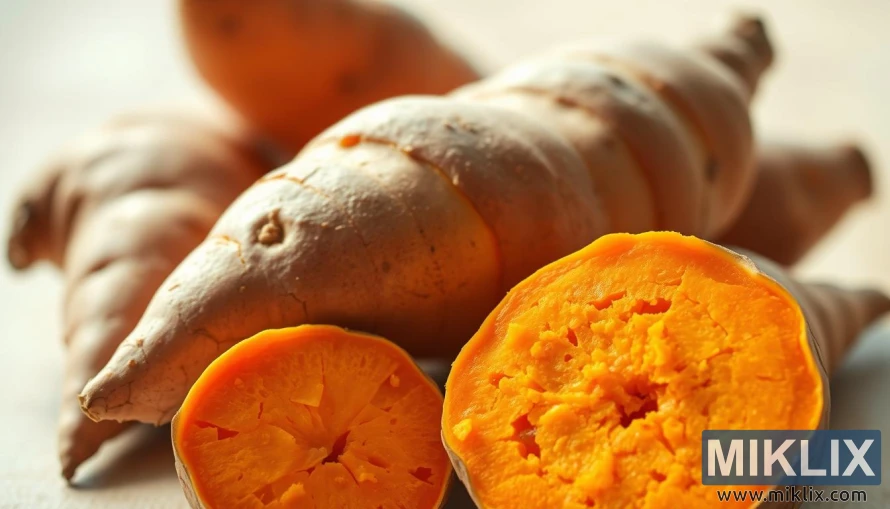Sweet Potato Love: The Root You Didn’t Know You Needed
Published: March 31, 2025 at 10:11:18 PM UTC
Sweet potatoes are a type of root vegetable that's both tasty and packed with health benefits. They come in different colors like orange, white, and purple. Each color has its own set of nutrients. They are full of vitamins A and C, manganese, and fiber. Adding sweet potatoes to your meals can be very good for you. They help fight cancer, improve gut health, and even boost brain function.
Key Takeaways
- Sweet potatoes are nutrient-dense root vegetables.
- They promote gut health and improve digestion.
- Rich in antioxidants, sweet potatoes may have cancer-fighting properties.
- These sweet tubers support overall brain function.
- Including sweet potatoes in your diet can help boost immune system function.
- They offer significant benefits for skin health.
- Sweet potatoes can aid in weight management by promoting satiety.
Introduction to Sweet Potatoes
Sweet potatoes have won the hearts and taste buds of people worldwide. They are known for their versatility, rich flavor, and health benefits. They play a big role in many cultures, making them a favorite for food and health.
There are many types of sweet potatoes, each with its own texture and taste. You'll find:
- Orange-fleshed sweet potatoes
- White-fleshed sweet potatoes
- Purple-fleshed sweet potatoes
These sweet potatoes are great for baking, roasting, mashing, and frying. They're loved for their taste and health perks. Adding them to your meals can make them healthier and more enjoyable.
Nutritional Profile of Sweet Potatoes
Sweet potatoes are packed with nutrients that boost overall health. A 200-gram serving of cooked, mashed sweet potatoes has about 180 calories. It also has 41 grams of carbs and 6.6 grams of fiber. This mix makes sweet potatoes a great choice for any diet.
The impressive vitamin and mineral content in sweet potatoes includes:
- 213% of the daily value for vitamin A
- 44% of the daily value for vitamin C
- 43% of the daily value for manganese
- 15% of the daily value for potassium
Sweet potatoes also have smaller amounts of vitamin B6, vitamin E, and iron. Their high fiber helps with digestion and keeps blood sugar stable. This is good for people with diabetes or those at risk.
Sweet potatoes are also full of antioxidants, like beta-carotene. This antioxidant turns into vitamin A and fights free radicals in the body. It helps lower oxidative stress. The vitamins and minerals in sweet potatoes boost the immune system and support healthy vision.
Highly Nutritious Root Vegetable
Sweet potatoes are among the most nutritious root vegetables. They are packed with vitamins and minerals like copper, potassium, and vitamin B6. A 100-gram serving of sweet potatoes has about 0.6 mg of copper, 337 mg of potassium, and 0.2 mg of vitamin B6.
White potatoes have less copper but more potassium and vitamin B6. Sweet potatoes have more copper, making them better for your health.
Colorful sweet potatoes, like purple and orange ones, are full of antioxidants. Purple sweet potatoes have anthocyanins, which are good for your health. Orange sweet potatoes have beta-carotene, which turns into vitamin A.
Vitamin A is a strong antioxidant. It helps protect your body from harm. Sweet potatoes are not just nutritious; they also offer many health benefits.
Promote Gut Health with Sweet Potatoes
Sweet potatoes are great for your digestive health because of their high fiber content. They have both soluble and insoluble fibers. These fibers help make your bowel movements regular.
Here are some key points about how sweet potatoes support gut health:
- Soluble fiber forms a gel-like substance. This helps slow digestion and improves how your body absorbs nutrients.
- Insoluble fiber makes your stool bulkier. This helps you have regular bowel movements and prevents constipation.
- Both types of fiber act as prebiotics. They help beneficial gut bacteria grow.
- This environment helps reduce the risk of colon problems. It also promotes a healthier gut microbiome.
Sweet potatoes are not just good for fiber. They also have antioxidants that help keep your gut flora balanced. Adding them to your diet can boost your gut health. It also gives you the dietary fiber you need for overall health.
Anti-Inflammatory Properties
Sweet potatoes are not only tasty but also full of health benefits. They have a lot of antioxidants, which are even more in purple varieties. These antioxidants, like anthocyanins, fight chronic inflammation.
Chronic inflammation can lead to serious health problems like heart disease, diabetes, and cancer. Eating anti-inflammatory foods like sweet potatoes can help lower inflammation markers in your body. This is key for keeping your health in check.
By adding sweet potatoes to your diet, you also protect your body from free radical damage. This supports your body's natural defenses.
May Have Cancer-Fighting Properties
Research shows sweet potatoes might fight cancer, thanks to antioxidants. These nutrients help fight oxidative stress, which can lead to cancer. Purple sweet potatoes stand out because they have lots of anthocyanins. These might stop some cancer cells from growing.
Studies suggest sweet potatoes could help against bladder and colon cancers. More research is needed, but the findings are exciting. They show sweet potatoes could be a key part of a healthy diet.
Eating sweet potatoes can make your meals tastier and healthier. The link between antioxidants and cancer is a big reason to keep studying them. Sweet potatoes are a great choice for anyone looking to improve their health.
Support Healthy Vision
Sweet potatoes are great for your eyes. They are full of beta-carotene, which turns into vitamin A. This vitamin is key for good eyesight. Eating sweet potatoes can really help your vision.
Eating foods high in beta-carotene can stop vitamin A deficiency. This is a big problem for vision worldwide. Sweet potatoes are a tasty way to keep your eyes healthy as you get older.
Purple sweet potatoes have anthocyanins, which are good for your eyes. Mixing beta-carotene with these compounds makes sweet potatoes a top choice for eye health.
Enhance Brain Function
Sweet potatoes are not just tasty; they're also great for your brain. They're full of antioxidants, like anthocyanins in purple sweet potatoes. These help keep your brain safe from damage caused by stress and inflammation.
Studies on animals show that anthocyanins can boost memory and fight brain damage. While we need more human studies, sweet potatoes' antioxidants are good for your brain. Adding them to your meals can be a fun way to keep your mind sharp.
Boost Immune System Function
Sweet potatoes are key in boosting our immune system. They are packed with vitamin A, which is vital for our health. Vitamin A helps keep our mucous membranes strong, protecting us from infections.
Eating sweet potatoes can make our immune system stronger. They have antioxidants that fight inflammation. This helps our body fight off illnesses. Sweet potatoes are a tasty and healthy way to boost our immune system naturally.
Benefits for Skin Health
Eating sweet potatoes can greatly improve your skin health. They are packed with beta-carotene, a strong antioxidant. This helps protect your skin from damage caused by the environment, reducing signs of aging.
Beta-carotene also makes your skin more elastic. This can make you look younger and give you a glowing skin. Sweet potatoes have anti-inflammatory properties too. These can help calm irritated skin and treat different skin problems.
Adding sweet potatoes to your diet can make your skin healthier over time. The mix of beta-carotene and other nutrients keeps your skin looking vibrant and healthy.
Weight Management and Satiety
Sweet potatoes are not only tasty but also help with weight management. They are full of fiber, which makes you feel full and satisfied. This makes them perfect for those trying to lose weight.
Adding sweet potatoes to your meals helps control calorie intake. They give you important nutrients while keeping hunger away. This makes it easier to follow a healthy diet. Here are some benefits of eating sweet potatoes:
- Rich in fiber, aiding digestion and promoting satiety.
- Low in calories yet nutrient-dense, making for a balanced meal.
- Versatile in preparation, allowing for creative recipes that suit individual tastes.
Eating these nutrient-rich tubers supports weight management and overall health. They keep your energy up and hunger down.
Versatility in Cooking Sweet Potatoes
Cooking sweet potatoes offers a wide range of delicious options for any meal. They can be prepared in many ways, from simple to complex recipes. You can bake, boil, roast, or sauté them, each method revealing unique flavors and textures.
Sweet potatoes are great in both savory and sweet dishes. Here are some popular ways to use them:
- Sweet potato fries seasoned with spices for a crunchy snack.
- Baked sweet potato to serve as a comforting side dish.
- Mashed sweet potatoes blended with butter and herbs for a creamy accompaniment.
- Roasted sweet potato cubes tossed in salads for added nutrition.
- Sweet potato soup, perfect for warming up on a chilly day.
- Incorporating sweet potatoes into baked goods, such as muffins or pies, enhances flavor and nutrition.
The natural sweetness of sweet potatoes makes them perfect for creative recipes. They satisfy many taste preferences. Exploring how to cook sweet potatoes opens up a world of culinary possibilities and highlights their health benefits.
Potential Risks and Considerations
Sweet potatoes are good for you but have some risks. They contain oxalates, which can cause kidney stones. People who have had kidney stones should watch their oxalate intake closely.
Reducing foods high in oxalates, like sweet potatoes, can help prevent stones. This is because oxalates can bind with calcium, forming crystals that can cause stones.
Sweet potatoes are also high in carbs, which can affect blood sugar levels. They have a high glycemic index, meaning they can raise blood sugar quickly. This is a concern for people with diabetes or insulin resistance. To be clear, they are lower in overall carbs, but higher in simple sugars than regular white potatoes. This means they may be better for people watching their carbohydrate intake, but possibly worse for diabetics due to their potential for spiking blood sugar faster.
Boiling sweet potatoes might make them less likely to raise blood sugar. But baking or frying them can make this effect worse.
To enjoy sweet potatoes safely, eat them in moderation. Pairing them with foods that don't raise blood sugar as much can help. This includes lean proteins and non-starchy veggies.
The fiber in sweet potatoes also helps slow down sugar absorption. This leads to a more gradual increase in blood sugar. It's important to watch how much you eat and your carb intake to manage blood sugar well.
Talking to a healthcare provider or a registered dietitian can help. They can give advice on how to safely add sweet potatoes to your diet. This is true for people at risk of kidney stones or those managing blood sugar levels.
Conclusion
Sweet potatoes are packed with nutrients and antioxidants, making them a key part of a healthy diet. They support gut health and boost the immune system. Their flavor also makes meals more exciting, appealing to both health buffs and casual eaters.
Sweet potatoes are not just tasty; they're essential for a healthy diet. Adding them to your meals can make a big difference in your health. They're easy to cook and fit well into many recipes, making them a great choice for improving your diet.
Choosing sweet potatoes means you're on the path to better nutrition and health. With their many benefits and delicious taste, they're a top pick for anyone looking to eat healthier.
Nutrition Disclaimer
This page contains information about the nutritional properties of one or more food items or supplements. Such properties may vary worldwide depending on harvest season, soil conditions, animal welfare conditions, other local conditions, etc. Always make sure to check your local sources for specific and up-to-date information relevant to your area. Many countries have official dietary guidelines that should take precedence over anything you read here. You should never disregard professional advice because of something you read on this website.
Furthermore, the information presented on this page is for informational purposes only. While the author has put reasonable effort into verifying the validity of the information and researching the topics covered here, he or she is possibly not a trained professional with a formal education on the subject matter. Always consult with your physician or a professional dietician before making significant changes to your diet or if you have any related concerns.
Medical Disclaimer
All content on this website is for informational purposes only and is not intended to be a substitute for professional advice, medical diagnosis, or treatment. None of the information here should be considered medical advice. You are responsible for your own medical care, treatment, and decisions. Always seek the advice of your physician or another qualified healthcare provider with any questions you may have regarding a medical condition or concerns about one. Never disregard professional medical advice or delay seeking it because of something you have read on this website.



